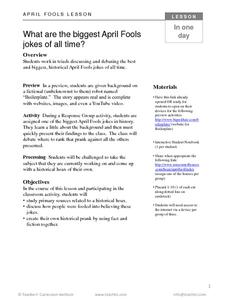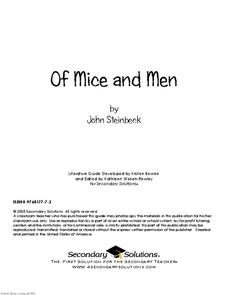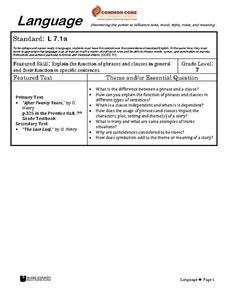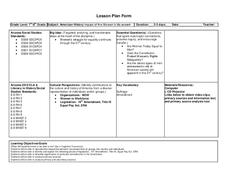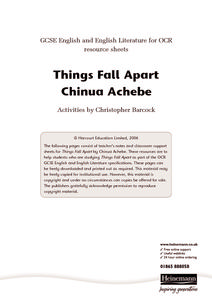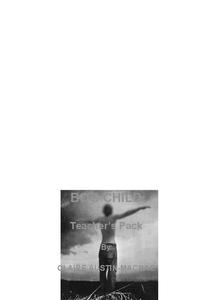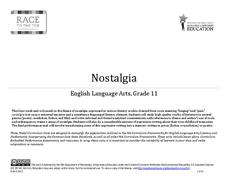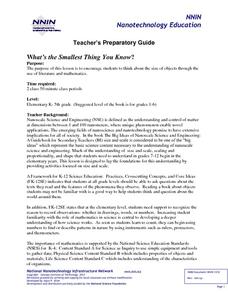Maryland Department of Education
The Concept of Diversity in World Literature Lesson 13: Unit Culmination - Symposium
To conclude a unit on the concept of diversity in world literature, class members conduct a symposium on "African Literature in Global Perspectives." In order to earn a spot on the panel, individuals craft an original thesis that...
Fluence Learning
Writing About Literature: Comparing and Contrasting Characters in Heidi
Scholars read excerpts from the story, Heidi, in a three-part assessment that focuses on comparing and contrasting characters. Each part contains three tasks that challenge learners to discuss, answer comprehension questions,...
TCI
What Are the Biggest April Fools Jokes of All Time?
After working in groups to analyze primary sources related to a historical hoax, learners will discuss how people managed to be fooled and work to identify one of the biggest April Fools jokes in history.
Curated OER
The Rest Cure: Gender in Medicine and Literature
Read and discuss "The Yellow Wall-Paper" and the gender issues that the story brings up. Use articles from the time period to analyze, complete with specific discussion questions. After two days, scholars write an essay based on topics...
Dream of a Nation
Writing Interdisciplinary Essay
The Grapes of Wrath. The Jungle. Native Son. The Things They Carried. The Absolutely True Diary of a Part Time Indian. To address a current social, political, economic, or environmental issue, class groups pair the reading of a classic...
Secondary Solutions
Of Mice and Men: A Literature Guide
Whether you are planning on using Of Mice and Men for whole-class reading or as a selection for literature circles; whether you are new to John Steinbeck's novel, or it has long been a part of your curriculum, you will find a wealth of...
Fluence Learning
Writing About Literature Shakespeare and Plutarch
The Oscar for the Best Adapted Screenplay acknowledges a writer's excellence in adapting material found in another source. What do your class members know about adapted resources? Find out with an assessment that asks readers to compare...
Fluence Learning
Writing About Literature: Nature in the Writings of John Muir and Emily Dickinson
As an assessment of their skill in crafting a compare and contrast essay, class members read and compare the portrayals of nature in excerpts from naturalist John Muir's My First Summer in the Sierra and from poet Emily Dickinson's "The...
Houghton Mifflin Harcourt
The Old Man and the Sea Ernest Hemingway
Accompany a reading of Ernest Hemingway's The Old Man and the Sea with a thorough literature packet. Although the materials are meant to prepare readers for a timed essay, the background information and the activities are sure to engage...
Creative Competitions, Inc.
Odyssey of the Mind Curriculum Activity: Fantastic Fairy Tale
Learning about literature can be so much fun; it can also be made more accessible through projects and dramatic play. As they explore theme, character, and setting, the class gets creative and makes a dramatic recreation of a classic...
Japan Society
Akutagawa Ryunosuke and the Taisho Modernists
Japan's Taisho Period was a time when authors like Akutagawa and other Japanese modernists began to experiment with point of view and literary form, making the literature produced during this time period a natural choice for teaching...
California Department of Education
What Are My Options?
Where do I go from here? Start sophomores off on the right path using an activity designed with the future in mind. The final lesson in a five-part career readiness series helps individuals decide what's important to them before they...
Wake County Public Schools
Language
Have your class doing everything from reading literature, analyzing literary devices, identifying independent and dependent clauses, discussing, and writing creatively with the rich resource found here. After a mini lesson on independent...
Fluence Learning
Writing Informative Text: Did Shakespeare Write Shakespeare?
William Shakespeare penned some of the richest and most fascinating works of literature—or did he? Middle schoolers read three brief informative passages and conduct additional research to evaluate the claim that Shakespeare did not...
Echoes & Reflections
Perpetrators, Collaborators, and Bystanders
After the Holocaust, the world grappled with how to bring justice to the Nazis. But what to do with the thousands—if not millions—who allowed it to happen? Young historians consider the issues of guilt, collaboration, and responsibility...
Library of Congress
Marco Paul's Travels on the Erie Canal: An Educational Voyage
Following the book, Marco Paul's Travels on the Erie Canal, readers complete an activity for each chapter, take part in discussions, and respond to several questions. To show what they know, scholars create an alphabet book using primary...
Arizona Department of Education
American History Impact of the Women’s Movement
Take a look at important images that depict the women's suffrage movement, the support for the Equal Rights Amendment, and wage equity for women over the last two centuries. As class members work through a lesson on primary source...
Simon & Schuster
A Teacher's Guide to 1776 by David McCullough
David McCullough's Pulitzer Prize-winning novel, 1776, is the focus of a 28-page teacher's guide. The guide includes pre-reading questions, background information about key British and American figures, and chapter-by-chapter lessons.
Curated OER
Things Fall Apart Chinua Achebe
Here’s a 19-page Things Fall Apart teacher resource packet from the UK that includes background information on Chinua Achebe, the culture of the Ibo people before and after colonization, and activities designed to prepare learners for...
Curated OER
Bog Child
You are destined for an engaged and happy class as they read Siobhan Dowd’s Bog Child because there is nothing missing from this study guide, seriously. This might be the easiest novel to teach because you don’t have to do a thing in...
Odyssey of the Mind
Odyssey of the Mind Curriculum Activity: Performing Arts
The classical arts have made a lasting impact on our society and your advanced learners get to find out why. The activity starts as the children create a list of the arts found in society, they discuss how these art forms impact their...
University of British Columbia
The Outsiders: Identity, the Individual, and the Group
S.E. Hinton's The Outsiders is the anchor text in a unit that asks readers to reflect on their own identity, their place in their family, in groups with which they identify, and in school.
Massachusetts Department of Education
Nostalgia
To prepare for crafting their own memoir, class members examine poetry by Margaret Atwood, Billy Collins, Robert Hayden, and Claude McKay, stories by Richard Rodriquez and Willa Cather, and Barry Levinson's film Avalon. They examine how...
National Nanotechnology Infrastructure Network
What’s the Smallest Thing You Know?
Elementary learners listen to a story, then sort objects from largest to smallest at six different stations around the classroom. Adaptable for a large range of age and ability groups.




